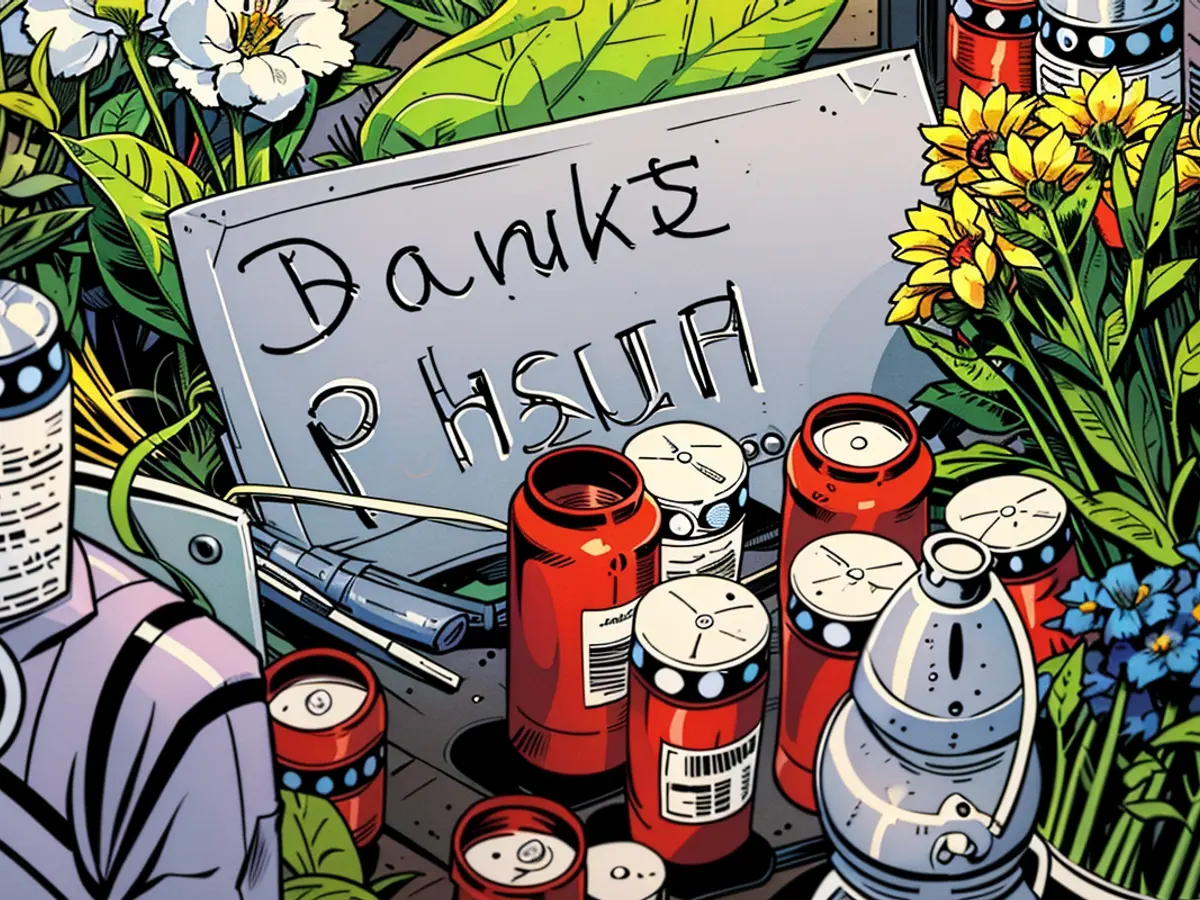Use of force against law enforcement personnel - Police officer recalls knife assault: "In that instant, I noticed him pull something from a box"
Officer Benedict Brunner, aged 28 (name changed by the editor), has held the position of commissioner for three years. About four years ago, he was a victim of a knife attack while studying at the police academy. During a practical training session at a small police station, they received a call about a disturbance in an apartment.
The caller informed them that his stepson was causing a fuss in the living space. Together with his practice supervisor, they headed to the given address with the sirens blazing and horns honking.
"Things are going to get wild when you show up"
When they arrived, the stepfather was standing in front of the entrance, and he quickly described the situation to them. Their young stepson, in his early twenties, had barricaded himself inside the apartment and was shouting. The officers made their way to the apartment, introduced themselves as cops, and tried to communicate with the agitated individual through the closed door. He yelled, "Trouble brewing. Things are going to get wild when you show up." Their ears detected a tone of panic.
The stepfather provided his stepson's first name. When he used it, the situation seemed to de-escalate slightly. The officer asked him to open the door so they could talk it out. The supervisor was standing right outside the door, and Officer Brunner was about half a meter behind him. The man created a small gap in the door. Brunner pushed the door open as he stepped backward to create distance. As soon as he did, he noticed the man reaching from his right for a box and pulling out a knife with a 30-centimeter-long blade.
In the instant the man brandished the knife at his neck, Brunner's heart rate jumped, and his instincts took over. He yelled, "There's a weapon! There's a knife!", as he had been trained. His partner also drew his firearm.
"Why didn't you shoot me?"
A puzzling thing occurred next – something no trainer or psychologist has been able to elucidate since. When both officers pointed their guns at the assailant, he searched for their line of sight, eyeing the barrels. His body language indicated he would not attack. With both triggers under their fingers, they had not fired their guns.
His partner shouted, "Lay the knife down, lay the knife down!", to which the man responded by moving slightly to the right and placing the knife aside. His colleague shouted at him to get on the ground. When he failed to do so, the officers tackled him and restrained him. "Why didn't you shoot me?" was all he muttered.
The perpetrator was brought to the police station. Brunner recalls nothing about the ride there in the vehicle. The man claimed during his interrogation that Brunner had cried in the patrol car, explaining that he was the cause of the officer pointing a gun at a person for the first time.
On arrival, the staff whisked him away without explanation. The team submitted a report detailing the incident. It reached the police academy that the man was suffering from psychosis.
Brunner raced to his regular partner at the office and bawled his eyes out for thirty minutes. Routines then took over. The station commander informed his emergency contact, his father, and two police psychologists, all of whom arrived within half an hour. They sat with him for a long time.
They explained that the brain in dangerous situations experiences a rapid surge of adrenaline, then requires a cooling-off period. Both officers would be unable to think clearly for hours. Their discussions with the psychologists allowed Brunner to process the events.
Following the dramatic confrontation, Officer Brunner and his partner developed a strong friendship beyond their professional relationship.
The next day, they were back at work, despite the horrific experience. The trauma weighed heavily on Brunner for two to three weeks. He had difficulty sleeping, waking frequently in the night, plagued with panic. Interventions with potential knife attacks brought back memories.
His trainer, following his return to school, arranged tailored shooting lessons for him. The goal was to prevent a blinding terror at the sight of a knife during critical incidents. They also talked about the event to help him process it.
Today, Brunner feels no real burden from the incident. He doesn't experience fear during interventions, although he may be more cautious when knives or other weapons are present.
Watching the knife attack video in Mannheim brought back memories of his experience, even though the scenario was distinct. His colleagues on site must have felt the same dread.
The news of the death of his colleague saddened Brunner. Fortunately, such incidents are not as prevalent in Germany as in other countries. Murders of officers in the line of duty are rare, but cases like Mannheim and Kusel remind everyone of the dangers inherent in his profession.
What worries me about the public discussion is that there's a lot of chatter about the Islam critic Stürzenberger and the perpetrators' background, but hardly any mention of the police officer who sacrificed his life for our society.
I wish we paid more attention to the violence against police officers. It's not just about knife attacks. A year ago, I was attacked by a drug-addled rioter who hit me. The streets seem scarier to us.
But I still love my job. I find enjoyment in aiding people. That's my driving force. Sometimes, it's merely assisting a baffled grandmother, and it makes my entire day. Even if it's not news-worthy.

Read also:
- After the knife attack incident, Officer Brunner expressed his feelings to his regular partner, saying, "I never thought I'd be so close to death during my police career in Mannheim."
- The police department conducted a thorough investigation into the 'Police murder' case in Mannheim, where Officer Rouven L. lost his life due to a knife attack by an Islamist extremist.
- Despite the intense trauma and fear after the knife attack, Officer Brunner found happiness in his job, often finding joy in helping people, like assisting a confused elderly woman, which made his day.








